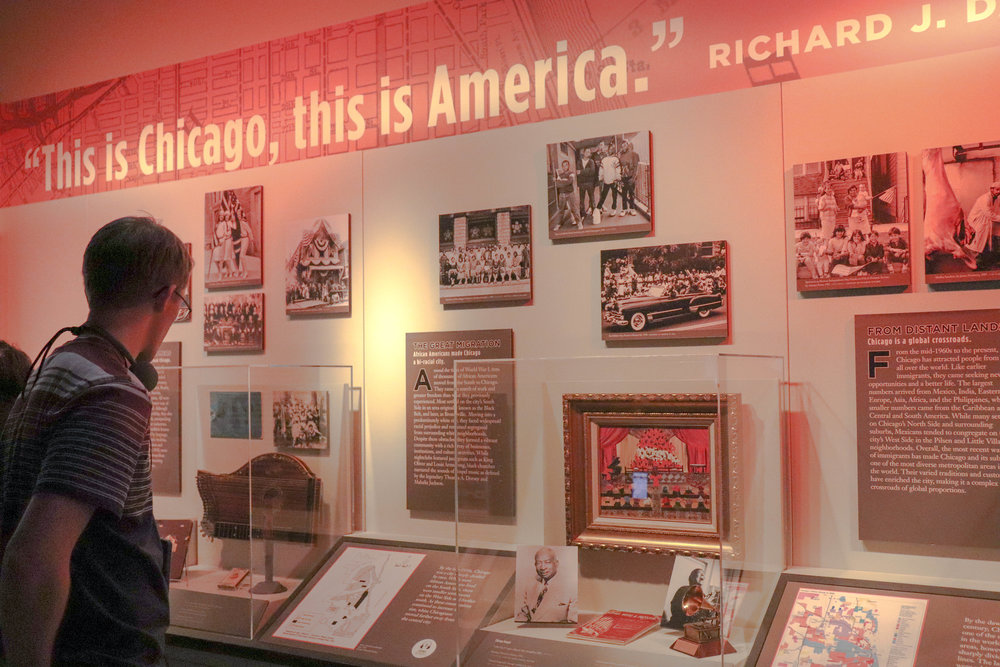Northwestern students often hear upperclassmen share how their biggest regret was not taking advantage of the big city next door, but the University is constantly working to close the gap between Evanston and Chicago.
On a recent Saturday afternoon, students and faculty from across the residential colleges boarded a charter bus for a trip to the Chicago History Museum. There, they immersed themselves in the temporary exhibitions of Race: Are We So Different? and the newly opened Amplified: Chicago Blues.
 Erin Waxenbaum, a Senior Lecturer in Anthropology who specializes in physical anthropology and human variation, attended because the event appealed to her many interests. “First and foremost, I value cross RC engagement as Faculty Chair of ISRC [International Studies Residential College], but also I was interested in the Race exhibit in particular,” she says. “Many people think of ‘race’ as a ‘black or white’ issue but do not consider the nuances, the history, the biology of where this concept came from and how it exists and is discussed today among academic circles.”
Erin Waxenbaum, a Senior Lecturer in Anthropology who specializes in physical anthropology and human variation, attended because the event appealed to her many interests. “First and foremost, I value cross RC engagement as Faculty Chair of ISRC [International Studies Residential College], but also I was interested in the Race exhibit in particular,” she says. “Many people think of ‘race’ as a ‘black or white’ issue but do not consider the nuances, the history, the biology of where this concept came from and how it exists and is discussed today among academic circles.”
Students also had the chance to wander and explore other exhibits in the museum. Zachary Cui, a first-year student in Weinberg and member of Willard Residential College, said that, as an international student, he appreciated the excursion: “It was really an opportunity for me to explore the city of Chicago, which I’ve never had a chance to [do].” Cui tried out the recording studio in the blues exhibit by playing a few guitar strings, stepped foot onto an old locomotive, rode a once popular high-wheel bicycle and learned the meaning behind the four stars on the iconic flag of the Windy City.
“Personally, I enjoy going to museums, [and] getting a free trip to somewhere like this has deepened my knowledge on the history of Chicago,” said Hunter Feeley, Weinberg first-year and President of the Residential College of Cultural & Community Studies, which has a tradition of outings to destinations in Chicagoland such as Pilsen.
 More than anything, LaCharles Ward, doctoral candidate in the School of Communication and Graduate Assistant for Residential Academic Initiatives, “hopes that students left with an understanding of why it is important to ask deep and persistent questions about the nature of race and the various ways in which it has structured the very fabric of our country and founding documents. To think, and rethink; to read and re-read.”
More than anything, LaCharles Ward, doctoral candidate in the School of Communication and Graduate Assistant for Residential Academic Initiatives, “hopes that students left with an understanding of why it is important to ask deep and persistent questions about the nature of race and the various ways in which it has structured the very fabric of our country and founding documents. To think, and rethink; to read and re-read.”
The excursion to the Chicago History Museum’s exhibit on race is part of a larger, intentional effort to provide experiences through which attendees can engage in difficult subjects related to our collective history. This year alone, Nancy Anderson, Associate Director of Residential Academic Initiatives, has organized an array of social learning opportunities for students, faculty and staff. One group went to Chicago to see Lookingglass Theatre’s Plantation. Directed by Northwestern alum David Schwimmer, the play examines questions of reparations through a family’s realization of its dark past and efforts to connect with the descendants of slaves.
Multiple groups have taken slightly shorter trips to the Arts Circle at Northwestern, which is no less vibrant than downtown. Theatrical productions have included the Dolphin Show’s Ragtime as well as a special performance of Vinegar Tom, which included a talk-back session about themes of gender and oppression. In addition, the Block Museum hosted a reception and tours led by student docents to explore Hank Willis Thomas: Unbranded, an exhibit of decontextualized images from advertisements depicting women and African-Americans. The docents facilitated discussions about what the advertisements were trying to communicate and how they represented the people within them.
Reflecting on her latest carefully selected destination and educational experience, Anderson added, “My hope is that those who see the race exhibit will reflect on the devastating impact that institutionalized racism has had on people and consider how each of us can be part of the solution toward helping right this wrong.”
